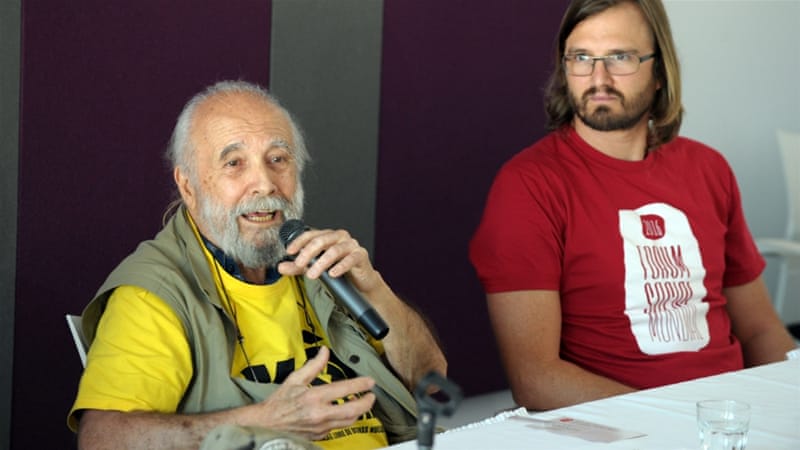 Toronto, Canada - As the World Social Forum (WSF) is set to kick off in Montreal, Canadian visa delays and outright refusals will leave scores of invited delegates out of the annual human rights event.
Toronto, Canada - As the World Social Forum (WSF) is set to kick off in Montreal, Canadian visa delays and outright refusals will leave scores of invited delegates out of the annual human rights event.
WSF organisers recently urged the Canadian government to intervene in what it described as a "wave of unjustified visa refusals" that has hampered the ability of hundreds of participants to attend the event, which runs from August 9-14.
This year marks the first time the WSF is being held in the Northern Hemisphere. The event brings civil society groups and leftist activists from around the world together to discuss human rights, the environment and other social issues.
Of around 2,000 delegates that received official invitation letters to attend, more than 70 percent had their applications for temporary visas to come to Canada denied, the organisers said, based on preliminary estimates.
"Many activists from Latin America, Africa and Asia received a negative response to their visa requests based on unacceptable, exclusionary and discriminatory arguments," organisers said in a statement.
'The first time'
Participants from the Democratic Republic of Congo, Morocco, Iran, Haiti, Nigeria and Nepal were most affected, as were others from Benin, Brazil, Burkina Faso, Ecuador, Ghana, Mali, Togo and Palestine.
Jamal Juma, a Palestinian human rights activist and head of the Palestinian Grassroots Anti-Apartheid Wall Campaign, got a visa to attend the WSF this year, but he said seven other Palestinian participants had their applications denied.
"This is the first time this happened in the World Social Forum, the biggest gathering for social movements from around the world," Juma told Al Jazeera in a telephone interview from Montreal on Tuesday.
"This is against freedom of movement. This is against freedom of speech for the people. This is totally undemocratic and racist. It is shocking to everybody," he said about the visa problems.
The reasons participants had their requests denied varied from lacking a "clear purpose" for the trip to a lack of funds or a belief the applicant would not return to his or her home country.
Juma said he had no doubt the visa denials would have an impact on the WSF speeches, workshops and other events.
"We are holding the responsibility to the Canadian government," he said.
Never asked
Among others, four Nigerian journalists working with Sahara Reporters, an investigative journalism project, had their visas denied because they did not provide bank details for the organisation.
But Omoyele Sowore, the group's founder and publisher, told Al Jazeera he was never asked to send in that information or amend the journalists' applications.
"The moment they accepted to have [the World Social Forum] on their soil, they should have understood that there would be no room for discrimination … For the Canadian government to deny 70 percent of the visas shows that they are not yet ready to open themselves to the world," Sowore said.
Immigration, Refugees and Citizenship Canada (IRCC) has a unit to help organisers of special events like the WSF secure Canadian visas, Citizenship and Immigration Canada Spokesperson Nancy Caron told Al Jazeera.
Caron said WSF organisers registered their event with the IRCC last spring, and the department gave them information about visa requirements and deadlines.
But she said the WSF team had not contacted the special events unit since April to report any problems or difficulties securing visas. She added the unit contacted WSF organisers on Monday to offer additional assistance, but it did not hear back.
Surprised applicant
"All visitors to Canada must meet the requirements for temporary residence in Canada, as set out in the Immigration and Refugee Protection Act (IRPA)," Caron said in an e-mail. "The onus is on the applicant to show that they meet the requirements for a temporary resident visa."
Ramy Ayari, a Tunisian activist who founded the LGBTQ rights group "Without Restrictions", was granted a visa and arrived in Canada last week ahead of the WSF.
He told Al Jazeera he was surprised his application was approved, since just last May he was denied a temporary visa to Canada on the basis that he did not have a job or a bank account and had never travelled before.
Ayari credited getting the visa this time to the "enormous pressure" organisations in Quebec applied on his behalf, but said it was disappointing to see so many others not have a similar chance.
"The Social Forum is organised for human rights so normally they accept everyone's visa applications so that they can come talk about their situations and what is happening in their countries," he said. "[This] is really shocking."
Source: Al Jazeera

No comments:
Post a Comment